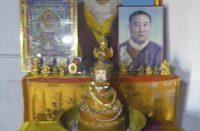High Peaks Pure Earth has translated a poem by Woeser that was written between 26 – 31 January, 2012, and posted on her blog on January 31, 2012.
This poem is dedicated to a Tibetan herder called Yonden who was killed on January 23, 2012, the first day of Chinese New Year, when police opened fire on a protest in Drango County (Kham, today’s Sichuan province).
As a commentary on the current situation in Tibet, read another recent poem by Woeser titled “Helpless”. Last year, Woeser also wrote a poem dedicated to a Tibetan monk of Kirti Monastery, Ngaba, who was arrested in Beijing for unclear reasons, read the poem by following this link to “Only This Useless Poem, Dedicated to Lobsang Tsepak”.

“To Yonden Who Was Killed By Gunfire”
By Woeser
If I hadn’t seen this photo,
Your name: Yonden [1]
Would be nothing but one of the compatriots
That had been ‘disappeared’ by every possible means for the past decades.
And it is a common Tibetan [2] name,
Just because it is the same as the monk who called me Acha [3] in Sera Monastery [4],
It is not overlooked by me in the name list of the dead that increases everyday.
That monk called Yonden from Rebgong [5], was expelled from the monastery ,
With countless fellow monks, by the guns of Chingdrol Magmi [6]
At midnight in the year of the earth mouse [7]
Hence wandering around the worldly earth that is full of danger
But facing this photo,
Your name: Yonden,
Turns into torrential tears,
Which still cannot fill the occupied homeland.
Curly black hair, ochre cheeks,
Because of fate we were both raised with tsampa [8]
Suddenly, I returned to the ancestors and siblings who have been in my previous lives as well as this one
This herder named Yonden from Drango [9], on the first day of the year of the dragon,
Was killed by the bullets of the Chingdrol Magmi with other unknown compatriots
Hitting the gawu [11] that was worn in front of the chest,
Has he already been sent to the peak of the snow mountain by the white horse?
Notes:
[1] Yonden: Tibetan language, meaning knowledge, culture. It is a commonly used name. In the poem, ‘Yonden’ refers to the name of one of the killed Tibetans in the Tibetan protest that took place on January 23,2012, when military police fired on the protesters in Drango county, Kardze Tibetan Autonomous Prefecture, Sichuan province. Yonden is a 49 year-old herder. The photo is from the International Campaign for Tibet website http://www.savetibet.org
[2] Tibet: Here, Tibet is transliterated into Chinese characters. In Chinese language, Tibet is called Xizang. According to traditional Tibetan geographic definitions, from high latitude to low latitude, Tibet is divided into three regions that are Upper, Middle, and Lower. As the saying goes, ‘Above there is Ngari, in the middle is U-Tsang, and down there is Kham’. In today’s regional divisions, they are distributed in the Tibetan regions of China’s Gansu province, Qinghai province, Sichuan province, Yunnan province and the Tibet Autonomous Region. They are also called Amdo, U-Tsang and Kham.
[3] Sera Monastery: Tibetan language, located in Lhasa, one of the most famous monasteries (Drepung Monastery, Sera Monastery, Ganden Monastery) of Lhasa.
[4] Acha: Tibetan language, meaning older sister.
[5] Rebgong: Tibetan language. It is located in Rebgong County, Malho Tibetan Autonomous Prefecture, in today’s Qinghai province.
[6] Chingdrol Magmi: Tibetan language, meaning China’s army, in Chinese it refers to People’s Liberation Army.
[7] Year of the Earth Mouse: The year 2008 in the Tibetan calendar.
[8] Tsampa: Tibetan language, it is made of roasted barley flour. As barley is an unique Tibetan food, tsampa becomes a symbol of Tibet
[9] Drango: Tibetan language, it refers to Drango County, Kardze Tibetan Autonomous Prefecture in today’s Sichuan province.
[10] Year of the dragon: the year of 2012 in the Chinese lunar calendar.
[11] Gawu: Tibetan, a protection box filled sacred holy objects such as Buddhist images.
Written on January 26, 2012
Finished on January 31, 2012





In reference to your notes ‘chingtrol’ in tibetan refers to ‘liberation’ – more specifically to ‘untie’ so chingtrol magmi = liberation army
The term འཆིང་འགྲོལ་ was coined by the Chinese in 1950s to mean liberation. The term is made up by compounding two words འཆིང་ meaning to bind or tie and འགྲོལ་ meaning untie or release. Literally it could mean released from being bound. In Buddhism, the term ཐར་བ་ is closer to liberation.
Pingback: Tibetan Poet Imprisoned in Her Beijing Home: Tsering Woeser – About | China News Center
Pingback: Tsering Woeser | Face of Tibet